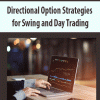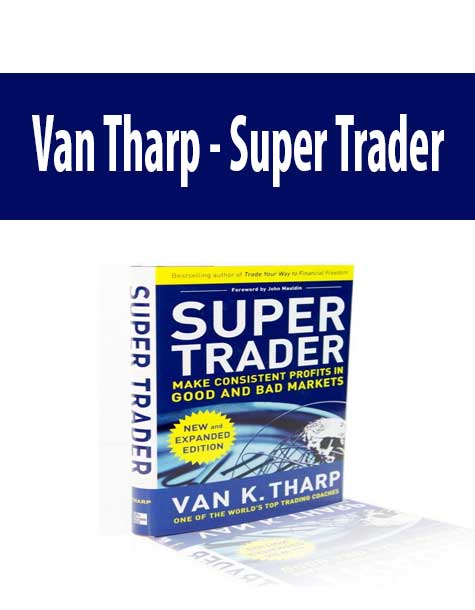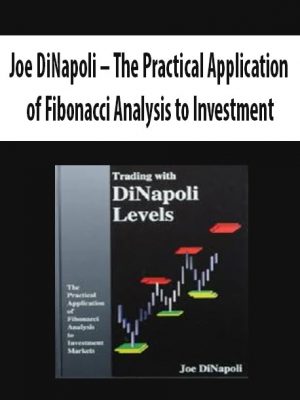Van Tharp – Super Trader
$28.00 Original price was: $28.00.$9.00Current price is: $9.00.
Become a Trader
No one is better suited to help you transform than legendary trading coach Dr. Van K. Tharp. Whatever your skill level, Tharp provides the formula for succeeding in a field where most people fail.
Combining the sharp insight and technical brilliance that have drawn legions of investors to his books and workshops, Tharp provides a holistic approach to becoming a successful full-time trader.
His system—a meld of investing psychology and sound trading practices—is the secret to achieving optimum conditions that produce results in both bull and bear markets. Using the lessons of Super Trader, you will approach trading as you would a small business—realistically, systematically, and enthusiastically. Drawing on his decades of experience, Tharp has created a simple plan designed to help anyone successfully navigate the market
Dr. Tharp wrote this book in an easy-to-read style—quite different from his more technical approach in previous works. Each short chapter focuses on one concept critical to trading success.
Every investor looking to improve their returns will also find this book highly useful. Super Trader concepts will help readers make money trading, avoid bear market losses, and lead happier, more balanced lives.
Throughout the book, Tharp raises the pertinent questions you must ask yourself about becoming a trader, being a trader, and succeeding as a trader. The rewards that come with being a Super Trader—both financial and personal—make you feel as if you can leap small buildings in a single bound.
How to Produce Consistent Profits:
Dr. Tharp’s book, Super Trader: Make Consistent Profits in Good and Bad Markets, is broken down into the five integral parts of successful trading to help you produce consistent, above-average trading profits under various market conditions.
Part 1, Working on Yourself:
Your beliefs shape you. One of the critical aspects of self-work is examining your beliefs to determine whether they are useful. This section of the book takes you through assessing your beliefs and how to change the beliefs that limit you.
Part 1, also covers the following topics:
- Completing a thorough self-assessment, including a 17-point questionnaire that separates the real traders and investors from the pretenders
- Understanding why commitment is so vital to trading well
- Taking personal responsibility for the results you get
- Empowering yourself
- Handling obstacles that get in your way
- Dealing with beliefs that determine how you trade
Part 2, Developing a Business Plan:
Your trading business plan should include your beliefs about the big picture and strategies that work with those beliefs, the systems that make up your business, and a worst-case contingency plan. This section of Super Trader will help you create a successful plan based on your objectives and beliefs. This document will be your assistant throughout your trading career; it will become a working document that you’ll want to refer to often.
Part 3, Develop Trading Strategies That Work in Various Conditions:
It’s not that hard to develop a good strategy for any particular market condition. For example, during the roaring bull market in technology stocks, in the late 1990s, it was easy to buy high tech stocks and just hold on. But that strategy stopped working in 2000. And that’s what happens with most strategies: they stop working when market conditions change, but people keep on trading them. In this section, you will learn about how to read the market and design strategies that work under the current market conditions. You’ll also learn how to develop strategies that fit each of the six different market types.
Part 4, Understand How to Meet Your Objectives:
Your trading system has nothing to do with meeting your objectives. Instead, it has everything to do with determining how easy it is to achieve your objectives. What most people don’t realize, including most professionals, is that you meet your objectives through position sizing™ strategies. In Part 4, you’ll learn the position sizing basics, as well as position sizing methods you can use in your trading right now.
Part 5, Taking Steps to Minimize Your Mistakes:
If you have followed the first four parts of the book, you will have rules to guide your trading, and you’ll be confident that you’ll make money if you follow those rules. We define a mistake as “not following those rules.” Thus, it is only through making mistakes that you’ll fail to make healthy profits. Repeating the same mistake over and over amounts to self-sabotage.
Learn to determine what mistakes you make, how much they cost you in real trading profits, and how to avoid repeating those mistakes to minimize their impact on your bottom line.
NEW! The expanded edition includes three new chapters in this section on mistakes that specifically affect Mechanical, No-Rules Discretionary, Rule-Based Discretionary traders, plus a new chapter on common mistakes for each of these types of traders.
Customer Reviews:
“I constantly read about finance, and therefore, I am constantly disappointed by books that promise extensive lessons of practical knowledge but are really water-downed books with basics I learned a long time ago. Van Tharp in his book Super Trader does anything but this. He is probably the best on trading psychology that I’ve read, but he captures the crucial factors for success in other areas like analyzing performance, testing systems, and developing a plan for success. I love how he does not cosign people’s BS – he tells it how it is. Also, I found this book a lot easier read than his Trade Your Way to Financial Freedom, and it has a lot more exercises one can do at home. However, for someone really new to trading, I would recommend they buy both books and start with Trade Your Way to Financial Freedom. No matter what though, one could not go wrong with Tharp.”
— Patrick, Denver, Colorado from Amazon.com review
“This book focuses on four things:
(1) Be Open Minded
(2) Focus on Exit Strategies
(3) Positive Expectancy
(4) Create your own system by studying other people’s systems
“(1) Be OPEN MINDED: The book attempts to point out why most investors are too narrow-minded and get too attached to a single trading system. It argues for the importance of first knowing yourself, your habits, etc. before creating your own system.
“(2) Exit Strategies: The book attempts to explain why “Exit Strategies” are often more critical than “Entry Strategies,” how other systems often focus too much on entering the market and not enough on exiting the market and why this going against the grain is important.
“(3) Positive Expectancy: It teaches you how to create a system of keeping track of your trades so that (1) you’ll know your batting average and (2) don’t get discouraged like everybody else when a trade doesn’t go your way.
“(4) Create your own System: It shows you a bunch of other people’s systems in the hopes that you can pick and choose the right trading tools for yourself.
This book is definitely not a get-rich-quick book, and it’s more about developing a proper trading mentality, which the author sees as a key ingredient for most successful traders. It does not spoon feed, but it does force you to think and do your homework.”
Q & A
Ask a question
Your question will be answered by a store representative or other customers.
Thank you for the question!
Your question has been received and will be answered soon. Please do not submit the same question again.
Error
An error occurred when saving your question. Please report it to the website administrator. Additional information:
Add an answer
Thank you for the answer!
Your answer has been received and will be published soon. Please do not submit the same answer again.
Error
An error occurred when saving your answer. Please report it to the website administrator. Additional information:
Related products
Forex & Trading
Forex & Trading
Forex & Trading
Joe DiNapoli – The Practical Application of Fibonacci Analysis to Investment Markets
Forex & Trading
Forex & Trading













Very nice, new, set! | Van Tharp – Super Trader